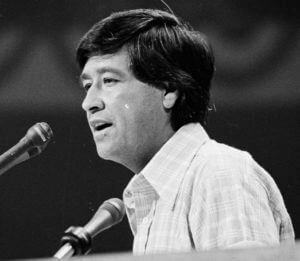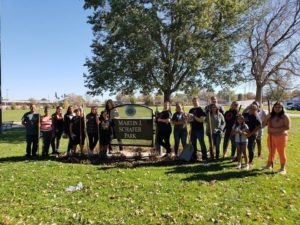Written by Juan Gallegos
When I first learned about organizing and the potency of speaking truth to power, one person leaped to the forefront of my mind: Cesar Chavez.
This week, the famous labor organizer, Latinx leader, and environmental activist is on the mind of a lot of Coloradans. As we honor his legacy on Cesar Chavez Day on March 31, we must remember Chavez’s compassion for the workers he mobilized, his passion for the issues he addressed, and the emphasis he placed on intersectionality.

Cesar Chavez speaking at the Democratic Convention in New York City in 1976.
Chavez immersed himself in the communities he worked in and people he advocated for, living in the same housing and conditions as the farm laborers he was organizing. He suffered with them, working in the same contaminated environment and enduring the same health effects.
Inspiring broad and diverse communities can be difficult for any organizer, from California to Colorado. Big change comes from small, often incremental acts. The slow, complicated processes of advocacy and democracy can often be a deterrent to organizing communities, rather than a source of inspiration.
“It’s amazing how people can get so excited about a rocket to the moon and not give a damn about smog, oil leaks, the devastation of the environment with pesticides, hunger, disease,” said Chavez. Part of the problem, Chavez recognized, is that wealth and whiteness often equal power in the modern political system. “When the poor share some of the power that the affluent now monopolize, we will give a damn” about environmental hazards, Chavez concluded.

Promotorxs at the park
Decades later, we still see this disparity between environmental justice and our communities of color, including the Latinx community. So, we’re working to do something about it.
The Protégete program began with one goal in mind: to build power in Colorado’s diverse communities so that everyone can participate and influence the political decision-making process. Often, the interests of Colorado’s Latinx folks and communities of color are superseded by well-financed campaigns and inherent prioritization of the wants of wealthier — and often, whiter — communities.
In its five years, Protégete has graduated over 200 people from the Promotorxs leadership development training. Promotorxs, also known as community navigators, train and learn about how the power of a shared identity can spur meaningful change in the government and environmental justice space. Promotorxs are also expected to complete a project that betters the environment and their community; this can range from park cleanups to data collection on air quality and health impacts.
The program also helps mobilize hundreds of Latinx folks at the Colorado State Capitol day during the annual Latinx Advocacy Day training, which Protégete co-sponsors every year. This year, almost 300 Latinx folks attended the event and had the chance to learn what it takes to organize around diverse issues and connect with lawmakers.
One thing that we can say is that we are working to make sure that our local governments “give a damn about smog, oil leaks, and the devastation of the environment.”

Protégete Director Juan with Dolores Huerta
It is my privilege to carry the torch in my new role as director of this wonderful program. Cesar Chavez and Dolores Huerta, who together started the United Farm Workers Union, are two of my heroes. They taught me that we don’t live single issue lives. Issues like racism, a lack of education, and poor access to transportation reinforce one another — and disproportionately impact communities of color.
As our team strives to engage and empower marginalized folks in the environmental movement, we take guidance from the folks that came before us. Cesar Chavez was a great organizer, who — although he was not flawless — formed one of the most effective grassroots organizations in modern U.S. history.
“Once social change begins, it cannot be reversed. You cannot un-educate the person who has learned to read. You cannot humiliate the person who feels pride. You cannot oppress the people who are not afraid anymore. We have seen the future, and the future is ours.”
As we honor Cesar Chavez and his work, we must remember that his fight encompassed the right to work and live in a healthy environment with clean air and water. No one should have to choose between a dignified wage and a safe environment. For Chavez, and for me: our future is worth the fight.



